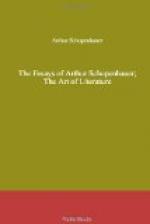Good writing should be governed by the rule that a man can think only one thing clearly at a time; and, therefore, that he should not be expected to think two or even more things in one and the same moment. But this is what is done when a writer breaks up his principal sentence into little pieces, for the purpose of pushing into the gaps thus made two or three other thoughts by way of parenthesis; thereby unnecessarily and wantonly confusing the reader. And here it is again my own countrymen who are chiefly in fault. That German lends itself to this way of writing, makes the thing possible, but does not justify it. No prose reads more easily or pleasantly than French, because, as a rule, it is free from the error in question. The Frenchman strings his thoughts together, as far as he can, in the most logical and natural order, and so lays them before his reader one after the other for convenient deliberation, so that every one of them may receive undivided attention. The German, on the other hand, weaves them together into a sentence which he twists and crosses, and crosses and twists again; because he wants to say six things all at once, instead of advancing them one by one. His aim should be to attract and hold the reader’s attention; but, above and beyond neglect of this aim, he demands from the reader that he shall set the above mentioned rule at defiance, and think three or four different thoughts at one and the same time; or since that is impossible, that his thoughts shall succeed each other as quickly as the vibrations of a cord. In this way an author lays the foundation of his stile empese, which is then carried to perfection by the use of high-flown, pompous expressions to communicate the simplest things, and other artifices of the same kind.
In those long sentences rich in involved parenthesis, like a box of boxes one within another, and padded out like roast geese stuffed with apples, it is really the memory that is chiefly taxed; while it is the understanding and the judgment which should be called into play, instead of having their activity thereby actually hindered and weakened.[1] This kind of sentence furnishes the reader with mere half-phrases, which he is then called upon to collect carefully and store up in his memory, as though they were the pieces of a torn letter, afterwards to be completed and made sense of by the other halves to which they respectively belong. He is expected to go on reading for a little without exercising any thought, nay, exerting only his memory, in the hope that, when he comes to the end of the sentence, he may see its meaning and so receive something to think about; and he is thus given a great deal to learn by heart before obtaining anything to understand. This is manifestly wrong and an abuse of the reader’s patience.
[Footnote 1: Translator’s Note.—This sentence in the original is obviously meant to illustrate the fault of which it speaks. It does so by the use of a construction very common in German, but happily unknown in English; where, however, the fault itself exists none the less, though in different form.]




